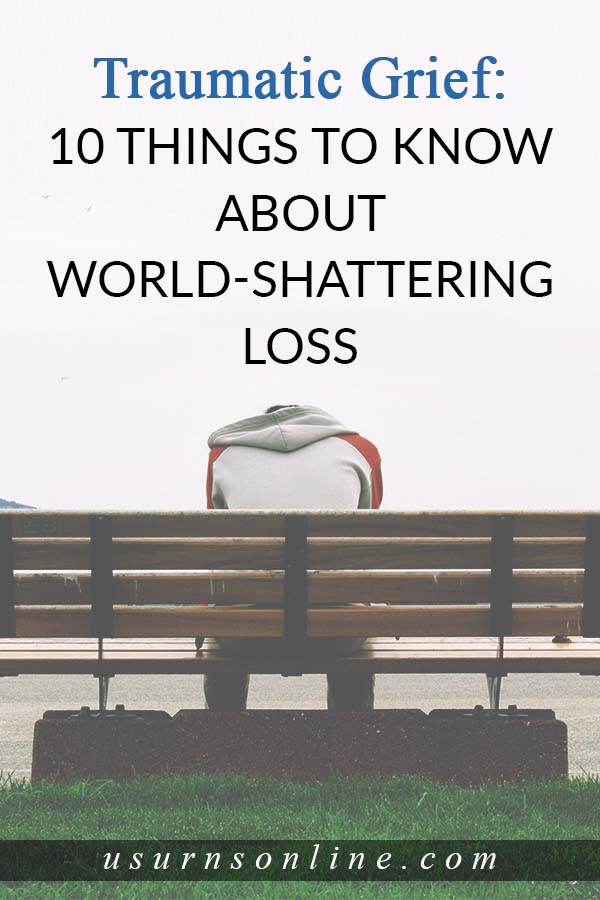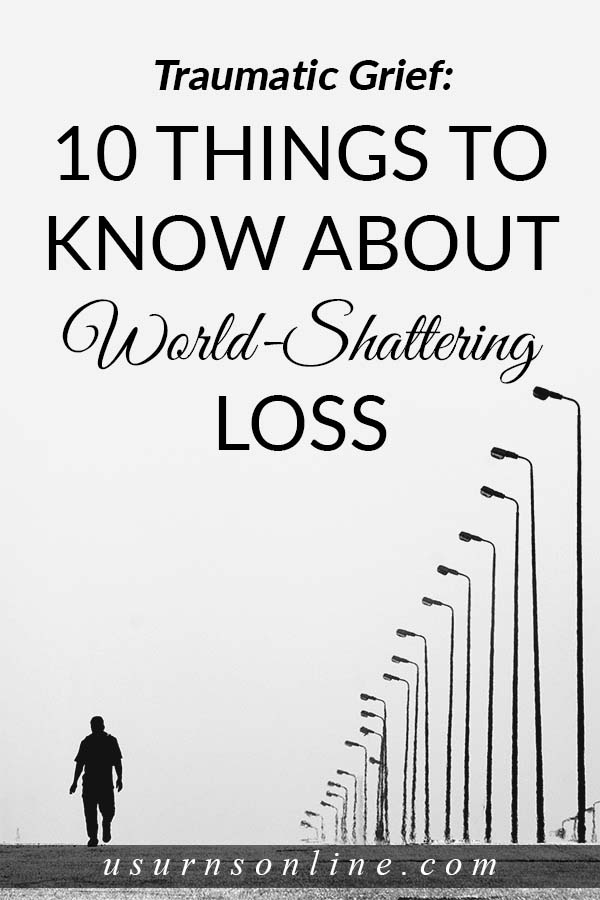The worst thing in the world just happened to you. Your loved one has tragically and unexpectedly passed. How will you ever get through this loss?
This is often called a traumatic loss. When you’ve experienced such an earth-shattering event, it is not uncommon to experience a similarly intense form of mourning called traumatic grief.
What is Traumatic Grief?
Traumatic Grief is the grief that you feel after the sudden or unexpected loss of a loved one. The bereaved person is coping with two burdens: the traumatic death of a loved one and the grief that goes along with it.

Is the death of a parent considered trauma?
If you are dealing with the death of a parent, you are dealing with trauma.
Imagine losing your parents to a fatal car accident at any time in your life and, yes, it would be terrible. Now imagine it happening to a child and you can see how much more traumatic it would be.
Is watching someone die considered trauma?
Watching a loved one die is trauma. If you are watching them die from a disease or witnessing a horrible tragedy, you are experiencing a high level of trauma.
Is traumatic grief the same thing as PTSD?
You should try to remember that death is not the only thing we grieve over. You can grieve the loss of a relationship, loss of a job, retirement, or even a physical disability.
Suffering from traumatic grief or PTSD may be caused by the same situations. However, traumatic grief and PTSD are different from each other. You may need professional treatment if you are suffering from either of these devastating issues.
10 Things to Know About Traumatic Grief & Traumatic Loss
1. Trauma isn’t always a surprise
It isn’t always an accident or a violent act that causes traumatic grief. For example, when you make important medical decisions about your loved one (such as organ donation or decisions concerning life support), this may cause traumatic grief.
2. Trauma creates a double grief
When you are dealing with trauma and grief it is two-fold mourning. The trauma felt is because you are dealing with the loss of your loved one as well as the grief that goes along with it.
Urns Made in the USA
3. Traumatic grief can be intense and long-lasting
When you are experiencing a traumatic loss, your grief will intensify and be prolonged. Be aware of your symptoms and seek professional help if necessary.
4. It’s important to avoid blaming yourself
You may meditate more on an unexpected death by trying to figure out the “why or how” this could happen. You may also suffer from guilt and blame centered around the death of your loved one.
5. Traumatic grief can make you feel like a social outcast
Suffering from this type of grief may make you feel alone and vulnerable. Unfortunately, society doesn’t always accommodate mourning that lasts longer than its predetermined ideals.
6. Traumatic grief may always be with you, but you can learn to cope with it
You are experiencing trauma that may never go away. These feelings can be managed and that is good news.
7. Traumatic grief is a mental health issue
Your untreated trauma can negatively affect your mental health. You might experience these symptoms with insomnia, nightmares, depression, anger, panic attacks, and in more ways than I have listed.
8. Traumatic grief often has physical symptoms
You could be experiencing physical symptoms when you are suffering from trauma or grief (not to mention both!). The symptoms displayed may be the development of heart palpitations, gastrointestinal problems, or even excess fatigue.
9. Children suffer from traumatic grief, too
It is so important to keep in mind that your whole family suffers from grief when someone dies. Being caught up in your own grief is easy and common.
10. Grief is normal
Grief is a normal emotion to experience after death. But, grief becomes abnormal when it intensifies and makes you feel stuck in the depths of it.
What Are the Other Types of Grief?
Unfortunately, there are many types of grief from which people can and do suffer. No grief is easy, and some forms of grief endure for longer periods of time.
The loss of a job, a divorce, a broken dream, can all cause grief. You should dealt with it because it is real. Ignoring the feeling of grief does not make it any easier because, ultimately, your grief will be compounded in the end.
It is important to know where you are in the healing process. Do you see yourself in anything that you have read today? If you need help, please check your local resources for counselors and support groups.
To want to learn more about the different types of grief and the grieving process, read The 16 Different Ways People Grieve.






It’s been 13 years since the tragic loss of my beloved 27 year old daughter Carly Marie 😢 💔 I am still struggling 😢 💔 There is not a single moment where she doesn’t leave my mind 💔 😢 I have lost so many family members and friends 💔 😢 in the past years 😢 💔 People just couldn’t understand why my grief was so much 😢 💔 Is there any hope 😢 💔 🙏 My faith is strong enough to keep me going until I see my daughter Carly Marie again 😢 💔 🙏
Hello,My name is Susan and I am so sorry for the loss of your daughter.I to lost my son just 5months ago he was my youngest out of my four children.He left me on his 29birthday I cry for him every single day my heart is broken I miss him so much.i know I’m not the same person anymore but this is so hard for me .
I lost my beautiful 24 year old daughter this coming July will be 20 years. Tears are streaming down my face because I miss her so. Today has been a difficult day but most days I cope pretty well time is a huge essence I pray for all parents who are walking down this path, I am so thankful Jesus has gave us a place where we will meet again. Yes the loss of a child forever changes who we are as a person.
I lost my son 49 suddenly this is so painful emotionally and physical pain. It’s only been a month, we are still in shock. I keep saying one day at a time and visit memories on his face book page this helps me get through the night.
My heart aches every time I read others grief journeys 💔
My traumatic journey began May 17, 2014.. 3 days off turning 25 When i lost my mum suddenly & tragically.
It took many years & the loving support my (then boyfriend) husband gave me. That got
myself to a point of excepting&
forgiving her for the choice she
made that night 🥺 I could’ve
never imagine 7 short years after losing mum in such a
heartbreakingly tragic way, my
wonderful husband and father (to
our then 2yr old twin boys) would leave me in the same way. Dec 26, 2021 – My heart and soul has been
to the darkest of dark, twice. And
most days are a struggle for me
but I’m grateful to have my beautiful boys to keep me going
💙💙
My heart aches every time I read others grief journeys 💔
My traumatic journey began May 17, 2014.. 3 days off turning 25 When i lost my mum suddenly & tragically.
It took many years & the loving support my (then boyfriend) husband gave me. That got
myself to a point of excepting&
forgiving her for the choice she
made that night 🥺 I could’ve
never imagine 7 short years after losing mum in such a
heartbreakingly tragic way, my
wonderful husband and father (to
our then 2yr old twin boys) would leave me in the same way. Dec 26, 2021 – My heart and soul has been
to the darkest of dark, twice. And
most days are a struggle for me
but I’m grateful to have my beautiful boys to keep me going
💙💙